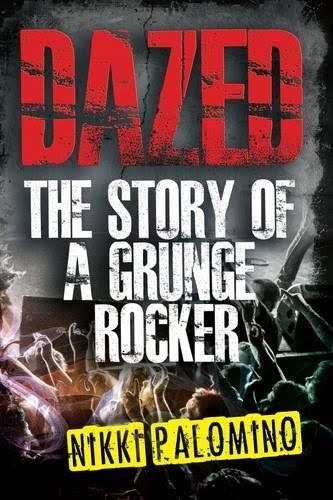Photo By: Isabelle Renate la Poutre
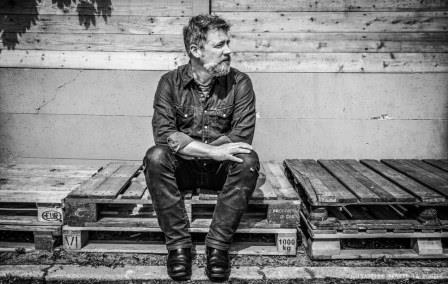
PUNK GLOBE:
Thanks so much for the interview Michael. Congratulations on your latest book release Dead Kennedys' Fresh Fruit For Rotting Vegetables. Can you give us some background on your early years?
Michael Stewart Foley:
Well, I grew up in New England in a kind of typical Irish-American family, with two brothers and two sisters (though my older sister and brothers were from my father's first marriage, so they didn't live with us).
We moved around a lot when I was little - six times by the time I was 7 years-old, I think. My father worked at a few different jobs in those years, and that was the main reason for all the moving, I think. We lived in tenements, and apartments mostly, but also in a trailer for a couple of years, and although i don't think I really knew it at the time, there were some lean years. I remember eating Underwood Deviled Ham on white bread for lunch everyday in kindergarten in Salem, Massachusetts, for example. Spam - I remember eating Spam, too.
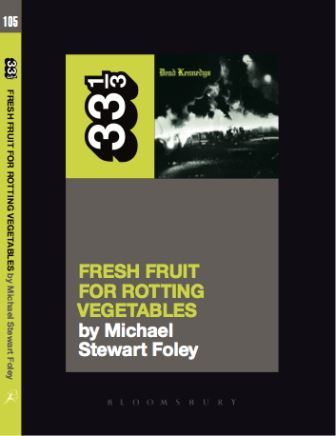
PUNK GLOBE:
You were born in Rhode Island but spent most of your formative years in New Hampshire. At what age did you move to New Hampshire?
Michael Stewart Foley:
Right, my whole family is from Pawtucket, Rhode Island. After moving to Massachusetts and a suburb of Pittsburgh, Pennsylvania, we moved to Rye, New Hampshire when I was still 6.
PUNK GLOBE:
Tell us a bit about the town/city where you grew up in New Hampshire?
Michael Stewart Foley:
At the end of first grade, we moved to Londonderry, New Hampshire. At the time, it was a pretty podunk place - pretty rural, still, with lots of apple orchards and a population of only about 5,000 people in the southern part of the state (about 45 minutes north of Boston). By the time I graduated from high school, it was on its way to becoming a Boston suburb and had about 25,000 people living there.
PUNK GLOBE:
Were your family involved with politics?
Michael Stewart Foley:
Yeah, my family was a hardcore Democratic Party, labor union family. My grandfather, who was a typographer for the Pawtucket Times newspaper, was president of his local for the International Typographical Union, and he was a mover and shaker in Democratic Party politics in Rhode Island. He never went to college but he was a speechwriter for Claiborne Pell during Pell's campaign for the US Senate, and apparently turned down an opportunity to go to work for him in Washington. My father worked as a linotype operator, too, and was, obviously in the ITU as well, and my mother was a member of the Newspaper Guild, working as a secretary at the Times when she met my father. So I was born into this family that loved Franklin Roosevelt and John F. Kennedy, you know/
Later, when we lived in Londonderry, and the town was growing so rapidly, my parents got involved in community groups interested in housing and building new schools. Out of that, my father ran for election as school district moderator and, eventually, as town moderator - so he presided over the annual school district and town meetings, at which all major decisions facing the town were decided by the citizens who showed up at a school gymnasium over two weekends each spring. As town moderator, he also presided over all elections.
So I grew up in this house where politics was instilled in us from an early age, and not just national politics, but local politics. And along with that came this sense that we're all meant to get involved, to do our bit, make our contribution to the community - to something beyond ourselves. By the time I got to junior high and high school, I started running for various offices for my class, but I also started working on electoral campaigns outside of school. And since we were in New Hampshire, we got to see a lot of big time campaigning for the presidency every four years, so I was absorbing all of that, too.
Photo By: Isabelle Renate la Poutre
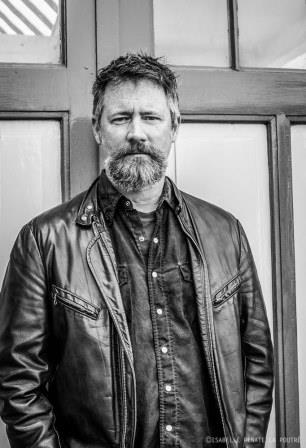
PUNK GLOBE:
At what age did you discover that you were interested in writing?
Michael Stewart Foley:
That's a good question. I remember having a sense that I liked writing as early as my freshman year in high school, and my father was always beating it into our heads that we needed to be good writers, that we needed to have "command of the English language" if we were going to make anything of ourselves (and, of course, he and my grandfather were excellent writers - just naturally gifted). But I don't think I really started to get interested in writing as a craft until I went to graduate school.
PUNK GLOBE:
Now you attended college in New Hampshire. What school did you attend and what was your major?
Michael Stewart Foley:
Actually, I went to college at Florida Institute of Technology and only much later went to the University of New Hampshire for my graduate work. I first majored in biology at Florida Tech, which was a disaster. It's funny that you asked about writing because any decent guidance counselor could have seen that my best courses in high school were English and Social Studies, and that I could write pretty well. But I went to college in 1982, it was still the cold war, and we were all going to be scientists; I didn't know anyone who was going into the arts and humanities. Anyway, I went off to Florida as a biology major and nearly flunked out after the first year - too many, um, distractions and not enough going to class - so then I switched to business, which was much easier, and wound up with a business degree. A whole other nightmare
PUNK GLOBE:
You eventually moved to Boston right?
Michael Stewart Foley:
Right, I got my first job in Boston at a big mutual fund company, where I spent the next five years as an internal auditor. It was fucking hell, I can tell you. I spent pretty much that whole time trying to figure out something else to do with my life. It took me a while, but eventually I started taking night classes at the Harvard Extension School, and that cinched it. I'd been reading all of these new books on the civil rights movement, and I decided I wanted to go to graduate school to be come a civil rights movement historian.
PUNK GLOBE:
How long did you live in Boston?
Michael Stewart Foley:
I worked in Boston for five years, but lived there for less than one year, I think. Even though I worked for this filthy rich financial corporation, I found Boston unaffordable, so I moved in and out of my parents' house a couple of times, and mostly commuted from southern New Hampshire every day - the train ride was where I read all of those books.
Photo By: Isabelle Renate la Poutre
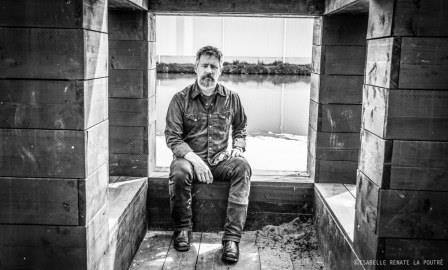
PUNK GLOBE:
In your latest book you write about Jello Biafra and The Dead Kennedys... Did you ever live in San Francisco?
Michael Stewart Foley:
No, I've never lived in San Francisco, though both of my brothers have. In fact, they lived there in the late 1970s, early 1980s, but they weren't punks, so had never been to the Mabuhay, for example. they were more like latter day hippies, I guess - into the Dead and the Airplane, you know?
PUNK GLOBE:
Deadheads! You have a strong friendship with Mickey Sampson tell us about that?
Michael Stewart Foley:
Well, I only first met Mickey a couple of years ago, but he's been like a big brother to me. I love the guy. In a lot of ways, I couldn't have done the Dead Kennedys book or my current project on early San Francisco punk without his help. When I first contacted Biafra about the DK book, he wasn't exactly enthusiastic about the project, but he at least recommended that I talk to some other people, including V. Vale and Mickey. And those two, Vale and Mickey, are, like a lot of people in the San Francisco punk scene, real and true intellectuals - the best kind of people to interview at the start of projects like these, when you're just trying to get the lay of the land and understand the parameters of what's possible research-wise. And, separate from all of the punk intellectualism, I'm just admire Mickey and the work he does now, defending death penalty cases and just fighting the good fight day in and day out. I would go to the barricades with that guy, I tell you.
"...like a lot of people in the San Francisco punk scene, real and true intellectuals"
PUNK GLOBE:
I am sure that you learned alot about the Dead Kennedys and Jello from Mickey. Did he also help you with getting others to help you in your research for the book?
Michael Stewart Foley:
Yes, Mickey was really helpful in putting me in touch with a lot of other people. He's been central to organizing many of the SF punk reunions, homecomings, etc., over the last several years, so he's in touch with a lot of key people. And then, when I went to the SF punk homecoming in 2013, he made a point of introducing me to a lot of people (including you, obviously). I've done about 40 interviews for both projects now, and each person ends up putting me in touch with several more, so it builds organically. It's a lot like the book I did on the draft resistance movement during the Vietnam War in that way; in that project, I focused on the movement in Boston, and did a lot of oral history interviews, too, and the project unfolded in similar fashion to these SF punk projects.
PUNK GLOBE:
Were you able to speak with Jello and the other members of the band ?
Michael Stewart Foley:
Yes, I interviewed Biafra, Ray, and Klaus, each at length. Bruce Slesinger (aka Ted), sent word that he wasn't interested in being interviewed, so I had to make do without him. But, yeah, even in spite of all the bad blood between the other three in recent years, they were incredibly generous with their time, letting me interview them for hours on end and responding to lots of follow-up emails. I'm really grateful to all of them because I couldn't have written the book I set out to write without their cooperation and support.
Photo By: Isabelle Renate la Poutre
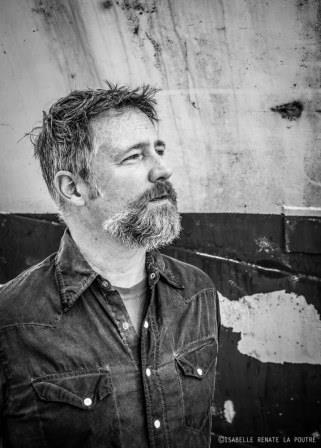
PUNK GLOBE:
How long would you say it took to do the proper research and compile all your notes and tapes to write and complete the book?
Michael Stewart Foley:
Well, it's hard to say because as I started to do the research on the 33 1/3 book, I realized I wanted to write this bigger book on the political culture of San Francisco punk - a much bigger topic than one Dead Kennedsy record - so I started combining the research on both. But it took me about two and a half years to do the research and writing, though I also uprooted my family and moved from England to the Netherlands in the middle of all that, so it could have taken less time, I suppose.
PUNK GLOBE:
Tell us about Bloomsbury?
Michael Stewart Foley:
Um, well, I did make that crack in the book's acknowledgements about Bloomsbury giving new meaning to that line from "Holiday in Cambodia": "you'll work harder with a gun in your back for a bowl of rice a day..." I don't know. The people I had the closest contact with there were all great to work with, but as an organization, as an institution, it's a bit like working with a major label, you know? I shouldn't say any more than that.
PUNK GLOBE:
Have you released all your books with Bloomsbury?
Michael Stewart Foley:
No, this is my first. I've published books with university presses, as well as a couple of trade presses - The New Press, and Farrar, Straus & Giroux - both based in New York. Obviously, one hopes that one's work will be read by as many people as possible, so even though I'm an academic, I try to write in a way that's accessible and that will be published and promoted by a trade press to a bigger audience.
PUNK GLOBE:
Tell us about your other books that you have released?
Michael Stewart Foley:
My first book was that one on the draft resistance movement during the Vietnam War, and then I edited and co-edited a few books: one on letters about the Vietnam War written to Dr. Benjamin Spock, the pediatrician and peace activist; another about the United States in wartime; and a third about Witness Against Torture and the effort to shut down Guantanamo. When I still lived in New York, I was an organizer with Witness, and we self-published that book as both a record of what we were doing, but also as a kind of organizing tool. Somehow Guantanamo is still open and operating, and Witness has continued to do the lonely work of protesting torture and indefinite detention in the face of a largely indifferent public, so we really need to do a second edition of that book. And I wrote a big book about grassroots politics in the 1970s and 1980s, that came out a couple of years ago.
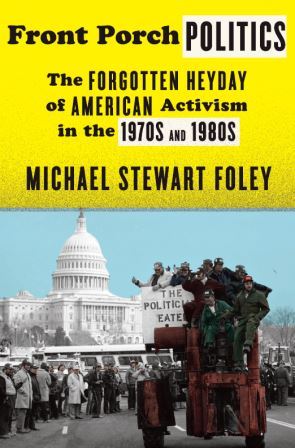
PUNK GLOBE:
Do you have a favorite or one that you are most proud of?
Michael Stewart Foley:
That last one, which is called Front Porch Politics, is the one I'm most proud of, I guess. It took me ten years to research and write, and although it didn't get the kind of attention I hoped it would, I think it will eventually help us to rethink that entire period after the 1960s as a period far more complicated than the prevailing interpretations - which focus only on the rise of the right, the so-called "age of Reagan," blah, blah - make it out to be.
PUNK GLOBE:
All of your books are political. Do you ever want to do a book that did not involve politics?
Michael Stewart Foley:
I don't know. I can't imagine working on anything that didn't have something to do with politics - mostly because I think pretty much everything is political on some level. The subjects that interest me - even if I could think of something that was somehow apolitical - all end up engaging with larger political questions. I'd kind of like to write a biography one day, but even if I wound up writing about a musician or an actor, I can't imagine that it wouldn't in some significant way engage with important political questions of that person's time.
PUNK GLOBE:
When did you move to to the Netherlands? What is that makes the Netherlands special?
Michael Stewart Foley:
We moved to Groningen two years ago. I had moved from a university job in New York to another one in Sheffield, England, and we had just had a baby - this was in 2009 - so it was a nice place to be with a growing family. But the job had it's frustrations, so when this job came up - for a professor of American political culture (at a 400 year-old university) - it seemed tailor made for me, and I was lucky to get it. We like the Netherlands a lot, even though my wife and I are struggling to learn Dutch. Our girls - ages 6 and 4 - are totally bilingual now, and really love it here. It's a very humane society. It's much smaller than the US, obviously - only about 17 million people across a pretty small geographic area - but you rarely see the kind of social dislocation (the homelessness, the obvious despair) that is so readily on display in some parts of the US. They seem to be able to manage those things well here.
PUNK GLOBE:
It certainly sounds better there than here in the USA. Do you ever plan on moving back to the United States?
Michael Stewart Foley:
I'm not sure. There's a lot we miss about the U.S. and about New York, and we really love the Bay Area, too, but right now, Europe feels like a good match for us as a family and for me, as a historian. The only drag is the cost of getting back and forth to California to do this research on San Francisco punk - the cost of flights is going up, just as our research budgets are getting cut. Maybe if I could get a visiting professorship in California for a couple of years, that would be a good way to balance things
Photo By: Isabelle Renate la Poutre
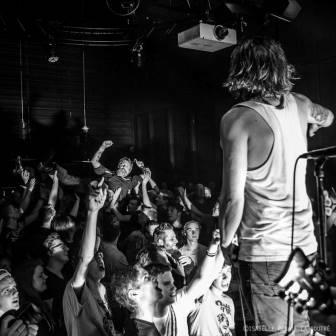
PUNK GLOBE:
Is your family all located in the Northeast? No one in California.
Michael Stewart Foley:
Almost everyone. My older sister and her family live in Illinois, but everyone else is in New England.
PUNK GLOBE:
Two of my favorite politicians are from Massachusetts and Vermont- Elizabeth Warren and Bernie Sanders... Any thoughts on them?
Michael Stewart Foley:
Of course! They're two of my favorites, too. I've been a Bernie Sanders fan for years, ever since he was mayor of Burlington. At one point in the 1990s, I used to go up to see the Bread and Puppet Theatre summer pageant every year in Glover, Vermont, and Bernie would often be there - not politicking, but participating! I suspect that the big money candidates will eventually go hyper-negative on him and turn him into the bogeyman, but for now, he seems to be moving the conversation. Not unlike Nader in 2000, he 's drawing enormous crowds - much bigger than the Bushes and Clintons can draw. And Elizabeth Warren is pretty fantastic on most issues, especially on inequality. As much as I'd love to see her become president, I think she's probably made the right choice to stay in the Senate where she can be a thorn in the side of the current and next administrations.
PUNK GLOBE:
You have also used the comedy of the fabulous Margaret Cho in your studies... I am sure everyone reading this is interested in finding out more about that.
Michael Stewart Foley:
Yeah, well, I teach a first year course called Theories of Culture that deals with identity - gender, race, class, ethnicity. And Margaret Cho's stand-up work is so brilliant and useful for a class like that because a) she is so good at confronting stereotypes and complicating whatever the hell it is that mainstream America calls "normal," and b) she's so fucking funny! Especially for me, teaching students in the largely homogeneous Netherlands, using snippets of Margaret's work can be really powerful. And, of course, it's hilarious to hear the students walking out of the classroom reciting her lines, word-for-word...
PUNK GLOBE:
like her mom asking her, "Margaret are you gay?" Have you used other people from pop culture for your study topics?
Michael Stewart Foley:
Yes, when I teach, I use a lot of popular culture, especially music. But , as we were talking about earlier, I'm also really interested in pop culture figures and the way they engage politics. So, for example, I've written some essays about Johnny Cash and the politics of the 1960s, especially the Vietnam War, which are really interesting because Cash was SO popular in 1969 and 1970 - selling millions and millions of records, hosting a network television show - and yet he was speaking out in various ways about the war. And right now, I'm trying to finally finish writing an essay on Rahsaan Roland Kirk, the jazz musician, and his engagement with the politics of race in basically the same period - late Sixties, early Seventies. And you know about the punk project - which is more subculture, perhaps, than popular culture, but I'm aiming to get more people to pay attention to how important punk politics was to young people in the late 1970s - a time when life seemed pretty desperate all over the US.
PUNK GLOBE:
Can you tell the readers the best places to buy your books?
Michael Stewart Foley:
I think almost all of my books should be readily available at your nearest, local, independent bookstore. Please by pass the apparent convenience of Amazon and those online gougers and give your business to your local independent bookstore. We need to keep those places alive, so if they don't have the one book of mine that you must have, ask them to order it. You'll get it nearly as fast as from Amazon, but your soul will be intact.
PUNK GLOBE:
Are you working on your next release as we speak?
Michael Stewart Foley:
Yes, I'm juggling a few projects at the moment. The big one is the book on the political culture of early San Francisco punk, from the Nuns and Crime to Flipper and Frightwig. But I'm also working with Geza X on his autobiography, as well as a few essays related to music and politics. I had started another project, growing out of the Front Porch Politics book, on the politics of homelessness in the 1980s, but I'm still waiting for a bunch of Freedom of Information requests to be honored by the Reagan presidential library.
"...political culture of early San Francisco punk, from the Nuns and Crime to Flipper and Frightwig."
PUNK GLOBE:
Any Internet addresses you would like to share with the readers?
Michael Stewart Foley:
I'm afraid I don't do much blogging or anything like that, but my work web page is at http://www.rug.nl/staff/m.s.foley/ and I can be found on Facebook pretty easily. I swore I'd be the last person alive to join Facebook, but then I starred doing all this work on San Francisco punk and to my surprise found that all these punks I needed to talk to preferred Facebook over email! I figured Facebook was the least punk thing on earth, but it turns out that punks make pretty good use of it, particularly in getting reconnected and sustaining their community over these last several years.
Photo By: Isabelle Renate la Poutre
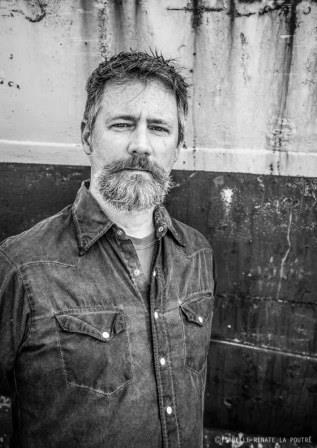
PUNK GLOBE:
Any last words for Punk Globe readers?
Michael Stewart Foley:
I'd just like to ask readers to think about how grateful they should be for nearly forty years of Punk Globe! Who else has stayed truer to the spirit of punk, month in and month out, for so many years, than Ginger Coyote? No one! For me, as a punk historian, few things matter more than finding reliable evidence of a scene, and Punk Globe has documented the scene, the subculture, as well as anyone and without selling out or moving to New York!
PUNK GLOBE:
Punk Globe would like to thank Michael Foley for the informative interview... Your very generous final words coincide with the 38th anniversary of Punk Globe.. Thank you so much!


